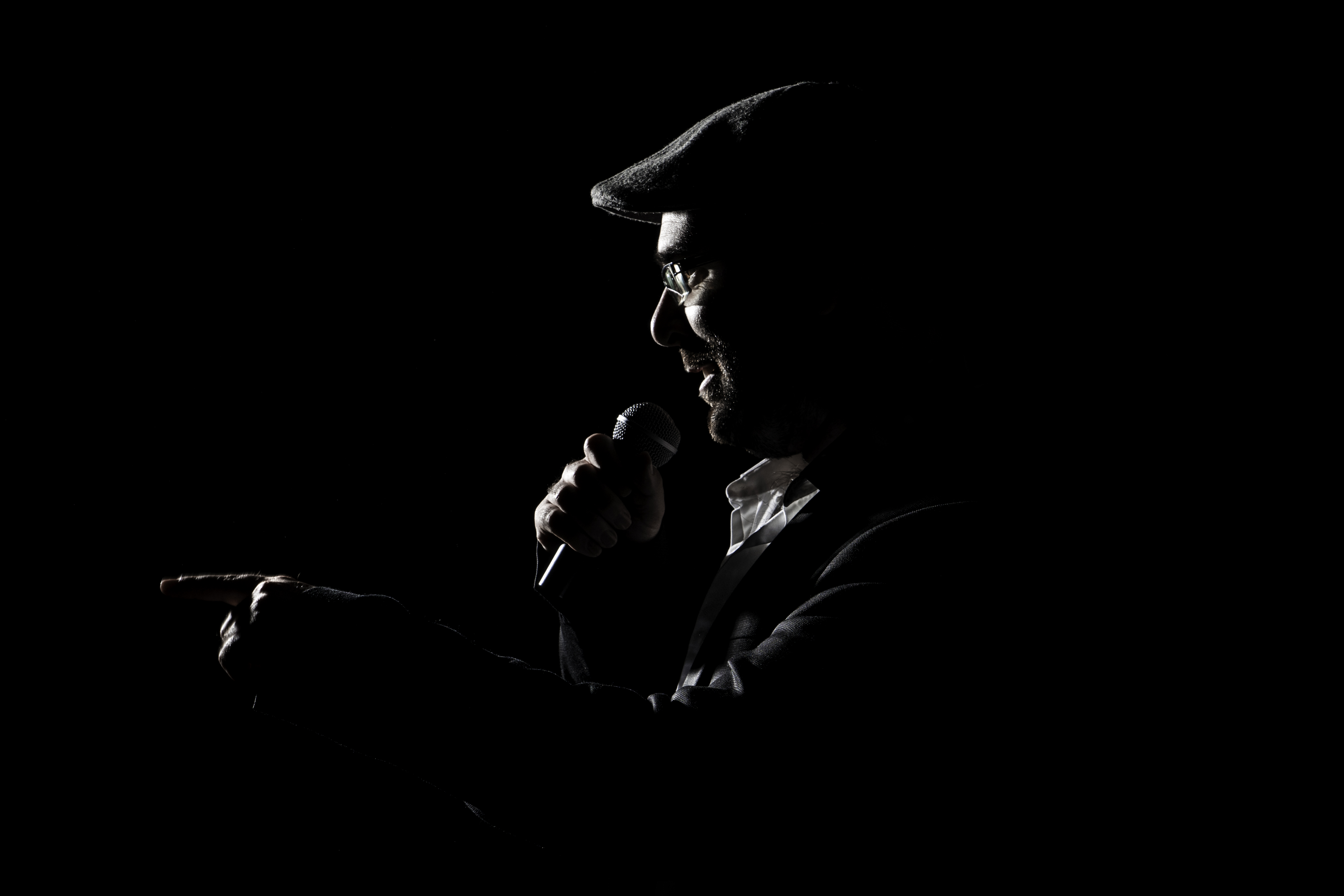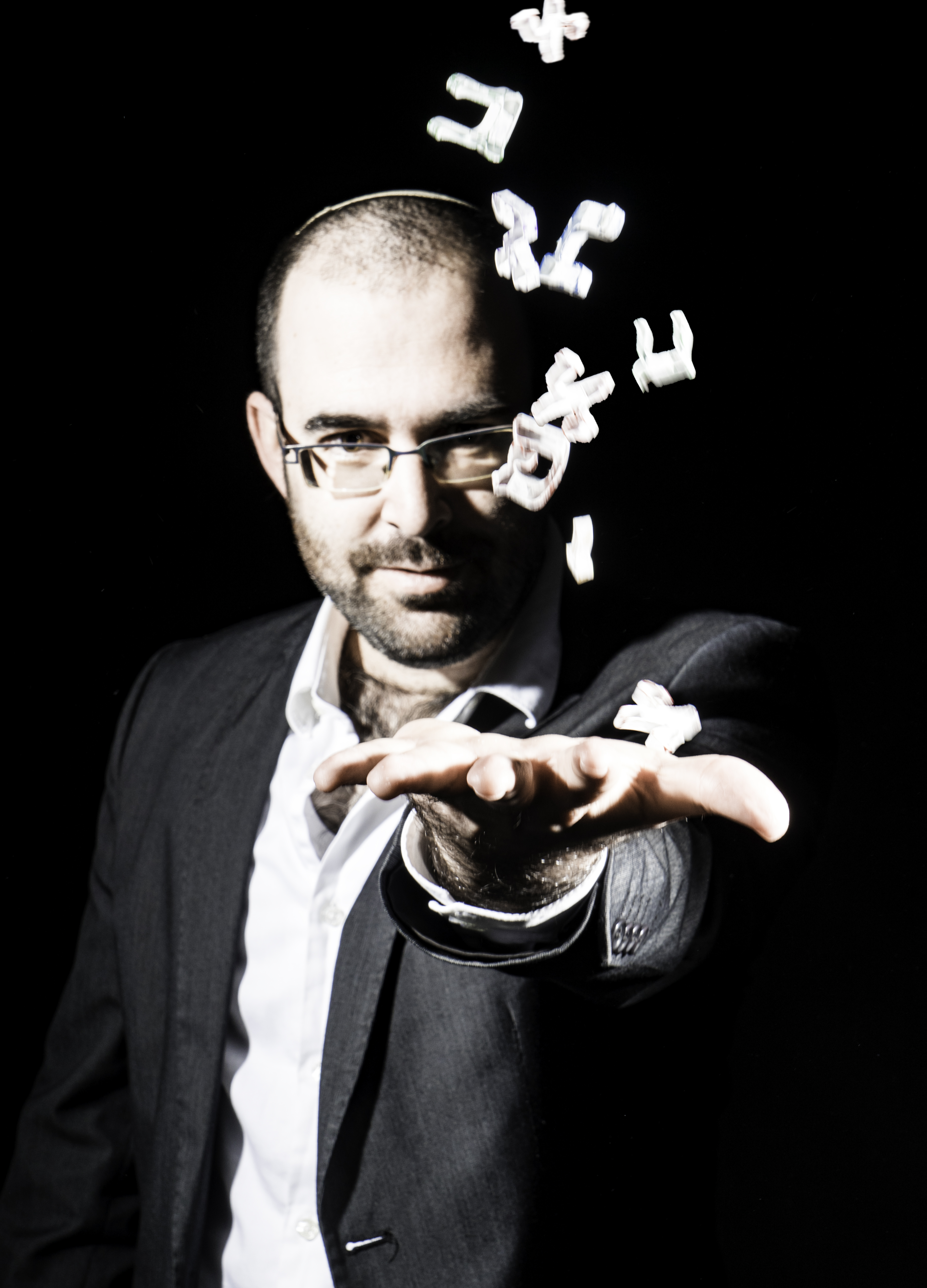Amir Moyal: "It's Important to Me to Prove That It's Possible to Be Funny – Within the Limits"
The scriptwriter and humor artist Amir Moyal discusses his early stages in the world of humor, his silent prayer before every performance, the post that saved lives, and the importance of clean humor. A serious interview with a hilarious guy.
 Amir Moyal
Amir MoyalIf you were working at the Tel Aviv high-tech company where Amir Moyal, a stand-up comedian and screenwriter, is employed as a purchasing manager, and only knew him from there, you wouldn’t believe what his second career is, which he works on tirelessly, always accompanied by a big smile. By day, Bill Gates; by night, a religious stand-up comedian filling venues with his performances. Before we dive deeper, I can’t resist asking one of Israel's notable internet personalities, whose musings frequently appear on Hidabroot's favorite compilations, about the duality between the two professions he’s chosen for himself.
"Yes, to the surprise of many who know me from Facebook or the shows, I work full-time at Mellanox, which is essentially a high-tech company specializing in accelerating data transfers between supercomputers. If you want to see a picture on Facebook, for example, it’s somewhere on a certain server, and when you click – you wait for it to appear. Our technology allows it to reach you as quickly as possible.
"At the company, I am a purchasing manager. We are a team of four, and our job is to buy everything the company needs efficiently, balanced, and economically. It involves a massive budget, millions of dollars every year. In principle, those who work in this field need a degree in logistics with a specialization in procurement or business administration, but I actually studied screenwriting, and through personal guidance, ended up here.
"After the army, I started working at FedEx and, thank God, I quickly advanced to a position as a customer account manager. After some time, I requested a change of position, and they assigned me as a FedEx worker at Mellanox. Shortly after, I was already hired as a regular employee in the company, where I remain to this day, and now I am the longest-serving member of the team".
Considering all this, I asked Amir why, given his great success in the entertainment world, he doesn’t leave his job and focus on developing a career in his beloved field. "There are two answers to this question," Moyal says. The first is humility. I consider myself and my abilities in this field and in general, to be at a lower level than others perceive. Due to that, I still don’t have the courage to risk it all.

"Every time more than ten people come to see me, it surprises me anew," he adds. "One of the more surprising times was the first solo show I did. Just me, stand-up, in front of the audience on stage, and that’s it. Over 200 people came. Beyond that, I maintain my day job because it's an economic matter. I have good conditions, in high-tech, they know how to pamper, the job is in a good location, and more.
"However, I can definitely say that I am slowly getting more confident about making this change. Hopefully with Hashem’s help, I will succeed. I believe that one day I will think it was absurd that I once engaged in tough negotiations for buying toilets," he says with a half-smile.
Not Joking About Religious Topics
Now let's set aside for a few moments the duality in Amir's professional life and tell a little about his personal life. Amir is 32 years old, married to Odia, and they have four children - Nofet, Yanoam, Tithallel, and Magad. Yes, Amir's originality is also evident in his children's names. According to Moyal, humor started for him at a very young age.
"When I was young, unlike other kids my age, I already remembered many jokes by heart. Really a lot. And I would tell them on various occasions. By the time I got to eighth grade, I distinctly remember, I started inventing my own jokes, not just retelling those I read or heard. By tenth grade, I was officially the class clown. But all those years, I was very afraid to stand alone in front of an audience. There’s a big difference between joking around with friends and something serious.
"Over the years, I continued with it more and more. I would send jokes via text messages to a fixed group of people, for instance. Then social networks came along. I was really one of the first who started posting there. I invested a lot of time and energy, and thank God it paid off. One of the users initiated a show of several social media figures and asked me to prepare a 15-minute set. I was under terrible, dreadful stress before the performance. I was afraid I’d forget jokes, that I wouldn’t succeed. But it was a lot of fun. I simply didn’t want to leave the stage. And that show introduced me to a new world. It was four years ago. Since then, I have performed many times. And thank God, most of the time, I continue to enjoy it".
Alongside stand-up, you have also engaged in screenwriting over the years. What can you tell us about that?
"I have always felt connected to the world of writing, and while working at FedEx, I went to study scriptwriting one day a week at the 'Maale' school. When I finished there, someone I knew from my community, who was working at Hidabroot Channel at the time, approached me and offered me to write a script for the show 'Tzur Mishelanu'. She said to me, 'It's a great show based on Pirkei Avot. Let’s see what you can do.' Before sitting down to write, I watched two episodes, and then I sent in the first one. After that, they asked me to write more. I am very happy with this collaboration".
By the way, regarding the Hidabroot Channel, how much do you choose to incorporate Hashem and the Torah into your complex occupation?
"I'll tell you something about this. Thank God, most of the comments I receive are good, but hear something less pleasant that happened to me at the end of one of the shows. Right as I got off the stage, a stern-looking man approached me and began to severely criticize me, saying I'm sinning, that I'm committing transgressions.
"And I, who so try to align with Hashem’s will, who am very strict about Halacha in my professional life and in general, who so much hopes there will be a Kiddush Hashem in every performance, and carefully prays for it in the minutes before I go on stage, received such severe accusations. This person claimed that because I joked about ethnic groups, Ashkenazis, Sephardis, etc., it was considered lashon hara (slander). I told him: 'Listen, I accept what you’re saying, and I’ll ask a rabbi.' And that’s exactly what I did.

"I contacted a well-respected rabbi many rely on for his opinion and consulted with him. He told me that anyone attending a comedy show is supposed to understand that jokes about communities do not constitute slander, and that everything in entertainment is done in an exaggerated way. It’s not what the comedian really thinks. And if it’s in the right measure, there is no problem.
"In general, Hashem is very present in my life, and I hope my performances uplift people, bring them joy, and provide them with positive energy. And I constantly check myself, as I fear something I say might be misinterpreted. Also, online, I only post 'kosher' content. Moreover, in my shows, I don’t joke about religious topics".
Speaking of performances, what kind of feedback do you get from your audience?
"Thank God, most of the feedback is positive. By the way, in our profession, it’s very easy to know. You feel during the performance if the audience is with you or not. You don’t even have to ask. However, in closed events, which are pre-booked by employee committees and the like, it’s harder to make people laugh. Often, it’s not your natural audience. And generally, stand-up is very stressful. Everything is on you. You’re alone on stage. A joke that isn’t funny is truly embarrassing. A tense silence descends.
"I often think that the money we are paid is not only for the show itself. It’s also for the stress before and after. And for the extensive preparations. In my case, it’s even more complex because many people are used to stand-up involving indecent topics and also joking about people in the audience. And I don’t do either of those. People, even secular ones, come and see that it’s possible to be very funny without those elements. And it’s very important for me to prove that it’s possible to be funny – within permissible boundaries. My stand-up covers all things related to life itself, to the little things, to childbirth, to raising children, to fatherhood. Those kinds of things".
The Post That Saved Lives
Towards the end of our conversation, as things deepened, I asked Amir what he thinks the Torah of Israel says about humor, and of course, he has quite a bit to say on the subject. "There are two sides to this coin. On one hand, the Torah opposes scoffing. There’s a negative attitude towards a mocker. On the other hand, there are positive stories about individuals who engaged in humor, like Elijah the Prophet, who said of two people in the market that they have a great reward in the afterlife because they make people happy. Furthermore, in the past and even today, there are scholars who start every lesson with a joke.
"So I think, without a doubt, Judaism encourages humor. When it talks about mockery, it’s more in the direction of sarcasm, cynicism, and things of that sort. Against people who question anything sacred. And that’s why you can’t prove anything to a mocker. Because they have no boundaries. But when you have good boundaries, it’s blessed. Furthermore, we can clearly see that humor is a very powerful tool, and we know that it has a great impact. Messages can be conveyed through it that can’t be conveyed in any other way. It’s a tool that can be used for both good and bad, and I, of course, try to make the most of it".
What other good things are you trying to spread through humor?
"One of the important values to me is the love and unity of Israel. Much of this comes from home. My siblings and I grew up in a completely religious home, but in a mixed community where both religious and secular people lived. It was a home where it was felt that the entire people of Israel is essentially one unit. My parents did a lot of 'kiruv' (bringing people closer to Torah). I don’t remember a single Shabbat in my entire life, I really don’t remember, where secular people, converts, etc., didn’t join us.
"And my wife and I also established our home in a mixed community. In my activity on social media and in my shows, it’s very important for me to create this discourse of unity of Israel. In terms of the practical side, there are do’s and don’ts about it. Regarding 'turning away from evil,' I try not to shame people who mock Judaism and don’t have much influence, because I see that it only increases hatred. And hatred among brothers is the worst thing that can happen to the people of Israel.
"On the side of 'doing good,' I often write on Facebook about Jewish holidays, everything according to the relevant matter. Before fasts or holidays, I try to explain what it is, in a light and pleasant manner. I also strive to help organizations that work for the unity and love of Israel. And I see that our activity on social networks greatly impacts reality for the better, thank God".
What really, in your opinion, is the true impact of social media? Does it really impact so much when most discourse is virtual?
"In my opinion, the power of social media is enormous and should be handled wisely. On a general level, I have no doubt that Facebook, for example, raises many topics that bring about a change in people's consciousness and in reality itself. And even on a personal level, I see great influences. I'll give one of many examples. A while ago, a woman with a very rare disease contacted me, and the medications for her illness cost 20,000 shekels a month.
"The medications were covered by the health basket, but she would be reimbursed once every quarter. Meaning she had to spend 60,000 shekels from her pocket, which she didn’t have. She was literally in a life-threatening situation. She tried repeatedly to speak with her health fund, but to no avail. After she told me about the case, I posted about it, tagged her health fund, and called on my followers to share.
"And behold, to my surprise, the very next day, they approved the matter, and not only that – two weeks later, they fired the person who refused to help her in the matter and forced her to pay out of her own pocket. He was not following the guidelines. In another case, I helped a project that dealt with hosting soldiers for Shabbat. For them, within a short time, thank God, we raised tens of thousands of shekels. Every tool in the world is a gift from Hashem. The key is to use it wisely and in holiness, to repair the world and not to destroy it. I very much strive to do so and pray that I continue to do so more and more".

